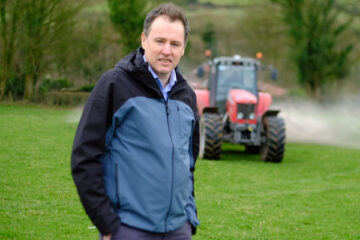Samaritans is the only 24-hour emotional support helpline covering the island of Ireland. Its volunteers answered over half a million calls and emails for help last year, supporting people in need through their darkest hours. John Hanlon — a part-time farmer and Samaritans volunteer — is urging farmers to reach out before times get too tough.
Life can be tough and at times we can feel under pressure and completely overwhelmed. This is particularly poignant now, some 2 years on from when Covid-19 restrictions became part of our everyday lives – at home, at work and on the farm.
Most people will need extra support at times in their life and that is nothing to be ashamed of. Samaritans would like to get the message out that its volunteers are here for you, your family and your friends. Call free any time, — from any phone — on 116 123. The number will not appear on a phone bill.
While Samaritans’ vision is that fewer people die by suicide each and every year, you do not have to feel suicidal to get in touch. Only 1 person in 5 who call Samaritans actually say they feel suicidal. People reach out for many reasons, including loneliness and isolation, depression, relationship and family problems, bereavement, financial worries, job-related stress, bullying and disabling physical illness or pain.
John Hanlon, a part-time farmer and volunteer in Samaritans Waterford & South East branch, said, “I find very few farmers ring us and that mainly goes back to the problem that ‘men don’t talk’. A lot of farmers are isolated, especially older farmers, and a big void in their life is having someone to talk to.”
“We want to get the message out that we’re here for them, 24 hours a day, seven days a week, on 116 123. This number is free from any mobile or landline and won’t show up on a bill. Samaritans is an anonymous service. We don’t know who the callers are, or where they are, so this safe space often allows people to share honestly what they are going through.”
John said many people felt isolated before coronavirus, but restrictions exacerbated this problem as people became more isolated and unable to go about their lives as they usually would. He continued, “if you’re feeling isolated, alone, or struggling with the pressures of farming or family, we’re here to listen”.
“You could be going through something new or have been struggling to cope for some time, either way, you may need emotional support to help you through. Unfortunately, some people do not have the support of friends or family they can turn to. While others do, they find talking to someone neutral can be beneficial.”
Samaritans has over 2,000 volunteers in 21 branches across the country, who answered over half a million calls and emails for support last year.
Before coronavirus restrictions last year, volunteers offered face to face support in branches or at festivals, while raising awareness at events such as the National Ploughing Championship.
Samaritans is also the mental health partner of the GAA and has a team of specially trained volunteers who offer support to clubs, communities, and schools following a suicide.
More recently, the charity launched a new handbook with practical advice on how well-being initiatives can appeal to men who may be going through tough times before they reach crisis point.
The handbook, ‘Engaging Men in Ireland Earlier: A Guide to Service Design’, is based on insights from a series of workshops with men. It provides five key principles for anyone designing, running or commissioning wellbeing groups for men.



